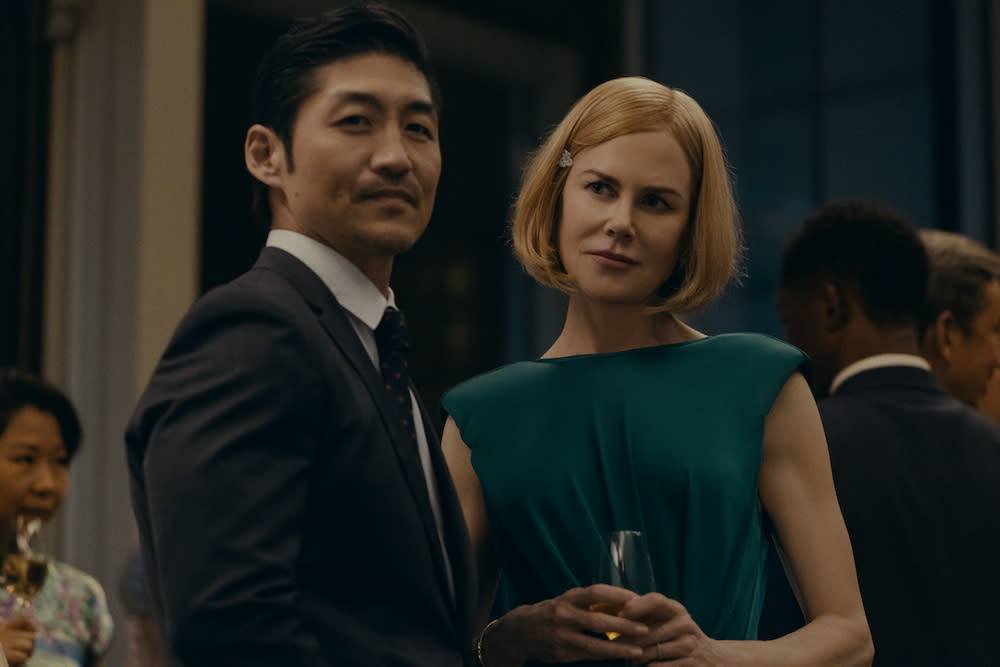‘Expats’ Review: Lulu Wang’s Stunning Prime Video Series Will Stick with You Long After It Ends


If life is a series of choices, then one persistent question often carries outsized weight: Do I stay, or do I go? Staying means surrounding yourself with family, friends, and familiarity. Going necessitates discovery, be it new places, people, or customs. There are always extremes and exceptions, of course, but the beauty of Lulu Wang’s rich new series, “Expats,” is that it relishes the personal twist on each answer — the unique specificity of life that contends with its universal demands. Maybe staying means choosing one person over another. Maybe going isn’t a choice at all. What remains, as a constant, is the tug of the unknown, the path not chosen, the future that could’ve been — or could still be.
All three protagonists in “Expats” chose, at one point or another, to go. Margaret (Nicole Kidman), Hilary (Sarayu Blue), and Mercy (Ji-young Yoo) are all Americans living in China. Margaret moved there with her children and husband, Clarke (Brian Tee), in part because his job pays better than hers does, and in part because their time in Hong Kong was supposed to be temporary. Hilary, who resides a few floors down from Margaret in a lavish apartment complex called The Peak, is also there with her husband, David (Jack Huston), but she’s very much the breadwinner, and she likes it that way. She’s happy with the way things are: her work, her weekday dates with David, and her dinner parties with friends.
More from IndieWire
Disney+ Wants to Make You Finish What You've Started - Report
Warner Bros. Discovery to Lay Off Fewer Than 1,000 Staffers in New Round of Job Cuts
Both women feel they have the freedom to decide their next steps, but their window is shrinking. Margaret is reeling from her youngest son’s disappearance. Hilary is striving to save her marriage. And then there’s Mercy, whose link to Margaret and Hilary I’ve been told not to disclose, and whose parents told her she was “cursed” at such a young age, that now she sprints toward catastrophe, as if to embrace the inevitable. An ill-advised affair, a dangerous solo swim, a low-paying job — why not? No matter what she does, her family’s unlucky “prophecy” can’t be undone, so why not lean into the pain?
Set in 2014, as the next generation of Chinese citizens fight for democracy via mass protests — fighting for their right to decide their own future — “Expats” wields its dire plot developments with beautiful purpose. Trauma, be it unforeseeable or self-inflicted, comes for us all, and Wang’s six-episode series uses it to nudge characters toward each other, toward a deeper understanding of the world, and toward their next decision. What happens when Margaret and Hilary, two extremely wealthy and privileged women, have to contend with circumstances beyond their control? How do they find their home again, when their home has been distorted, damaged, or turned against them? For Mercy, who’s given up on such comforts, how can she find forgiveness when she can’t forgive herself? Where should she turn, when she thinks disaster is waiting around every corner?
Stay or go? The question always lingers.
As its story steadily unfolds, “Expats” keeps introducing layer after layer, perspective after perspective, into its empathetic saga. The three leads hold the series together, but the ensemble grows in order to acknowledge their limited outlooks. Never is this stronger than in the feature-length Episode 5, “Central,” which premiered as a standalone screening at last year’s Toronto International Film Festival. Centering the Filipino expats laboring in Hong Kong as housekeepers and nannies, the episode cements a gestating theme: the fine line between working within a family and being part of one. Puri (Amelyn Pardenilla) feels sorry for Hilary, her employer, during her recent marital struggles, and the maid even defends her to other caretakers who are harsher on their self-involved bosses. Esse (Ruby Ruiz) feels similarly responsible for Margaret and especially Margaret’s kids, who she’s grown incredibly close with — too close, at times, for Margaret’s comfort (despite her repeated assurances that Esse “is family”).
Seeing things from the “helpers'” vantage points emphasizes the disconnect between classes, but also the unspoken issues that can drastically impact families. Esse is a member of the family, in that she lives in their home, cares for each of them, and factors into their daily and long-term plans. But Esse is decidedly not a member of the family because her role can be reduced or terminated at any moment. She isn’t a decision-maker, but a decision to be made by others, namely Margaret.
Acknowledging these oft-ignored facts can cast Margaret and Hilary in an unfavorable light. But while some stories would stop there — content to shout, “Hey, these ‘helpers’ are people too!” — Wang’s series (her first major work since “The Farewell”) is invested in a fuller rendering of its characters. “Expats” excels at depicting the cognitive dissonance within people, families, and society at large. Seen one way, Margaret’s plight is immense and unimaginable; she’s right when she claims her pain “is so much worse than anything you can imagine,” in order to justify the extreme measures she takes to heal herself. But seen another way, Margaret’s trauma is just one more hardship in a sea of misery; she’s being short-sighted and selfish when she steamrolls other people in order to make herself feel better.
“Expats” roots these perspectives in its characters, creating a dense tapestry where each thread carries real heft. Kidman takes her time unveiling Margaret’s roiling grief, though her first scene shares quite a bit. Wang (who directs every episode) starts behind Kidman, slowly curling around to face her, first revealing her seated son (who was initially hidden by his mother’s blocking) and eventually isolating Margaret from everyone else in the scene. She feels alone, even from her children. She grows steadily awkward and edgy as the conversation shifts from strictly business to polite personal inquiries. The tone of her voice, her posture, her attention — it all provides a window into Margaret, and Kidman allows her character to grow (and regress) in moments big and small.
Yoo is even stronger, balancing a lifetime of self-loathing with the still-questioning mind of a 20-something. She often appears carefree and relaxed, but even in those moments of peace, she conveys nagging anxieties that betray a long-held, less-than-flattering appraisal of herself. Yoo can sell the fierce resolution of a person lost in misery just as keenly as she can become the innocent young woman Mercy deserves to be. (The entire ensemble shines, but one more special shout-out to Tee, who brought me to tears multiple times.)
Wang, who led the small writers’ room that included author Janice Y.K. Lee, is attuned to each tonal shift, each building block, and each characters’ arc, no matter how big or small. Shooting on location in Hong Kong, her direction is intimate and striking. Recurring images tell their own stories, including an unremarked upon shot of two mops hanging to dry, and overhead shots that trail cars as they weave up and down the mountain near Margaret and Hilary’s home. The sense of place is unmistakable, and the more you dig into each element of the production, the more you’ll come away with from the series’ many threads.
Throughout it all, Wang makes it easy to see how individuals connect to a family, how families connect to a community, and how communities connect to society at large. Sometimes, it can be difficult to recognize how our personal motivations affect other people, especially when catastrophes feel big enough to overwhelm everything else, but “Expats” expertly breaks life down into parts, before bringing it all together again in a moving, unshakable portrait. It’s not just about whether you stay or go; it’s about knowing why you’re there, wherever that may be.
Grade: A-
“Expats” premieres Friday, January 26 on Amazon Prime Video with two episodes. New episodes will be released weekly through the finale on February 23.
Best of IndieWire
Sign up for Indiewire's Newsletter. For the latest news, follow us on Facebook, Twitter, and Instagram.
